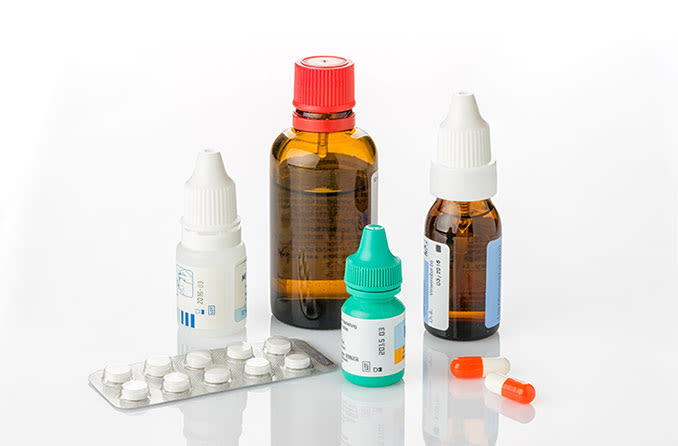Prescription and over-the-counter medication for pink eye

Medication can help alleviate pink eye symptoms
Sometimes, pink eye (conjunctivitis) doesn’t require medicine — it simply goes away on its own. Other times, medication is recommended to reduce the severity and duration of the condition. Remember to ask your eye care provider about any pink eye or conjunctivitis medications or remedies before trying them.
SEE RELATED: Learn more about the different types of pink eye
Over-the-counter pink eye medicine
Generally speaking, there aren’t any over-the-counter medications that will treat viral or bacterial conjunctivitis. However, they may help alleviate symptoms.
Artificial tears are often the first over-the-counter treatments recommended by eye care providers. Preservative-free tears can help reduce eye inflammation and dryness that accompanies pink eye.
Over-the-counter antihistamine, decongestant and vasoconstrictor eye drops can reduce the redness and irritation of viral pink eye. All three work to shrink the size of the blood vessels along the surface of the eye.
Antihistamines block histamines, part of your body’s immune response to an infection or allergy. Histamines cause allergic reactions and the widening of blood vessels. This translates into irritation you can see and feel.
Decongestants specifically constrict blood vessels in the eye, reducing redness.
Like decongestants, vasoconstrictors also specifically target blood vessels.
Mast cell stabilizers inhibit the release of histamines and can provide additional itchiness relief. Some mast cell stabilizers are over-the-counter, but some require prescriptions. Medication containing ketotifen fumarate is often available over the counter.
For viral pink eye, over-the-counter combinations can include the drugs naphazoline and/or pheniramine.
Patients with allergic conjunctivitis have a few more options. An eye care provider may recommend an over-the-counter allergy medication, taken orally to reduce the body’s overall response to allergen(s).
More potent antihistamine eye drops will require a prescription. But mast cell stabilizer, olopatadine, is a common over-the-counter alternative.
Prescription medication for pink eye
If an eye care provider recommends treatment for a viral or bacterial pink eye infection, it will almost always require a prescription and pickup from your local pharmacy.
Antibiotic eye drops are the main treatment for bacterial conjunctivitis, but they aren’t always necessary. Most cases of bacterial pink eye are mild and heal on their own within one to two weeks without any treatment, according to the American Academy of Ophthalmology.
A true bacterial infection, however, typically does not self resolve and will require antibiotics. In addition to others, your eye care provider may prescribe eye drops containing one of the following antibiotics:
Erythromycin
Bacitracin
Ciprofloxacin
Azithromycin
Levofloxacin
Ofloxacin
Moxifloxacin
Gatifloxacin
Some types of bacterial pink eye may also require oral antibiotics, but this is less common.
Viral conjunctivitis almost always goes away on its own and can’t be treated with antibiotics. However, antiviral drugs may be used in more serious, rare cases.
Bacterial and viral pink eye can be very contagious. Even with medication, you can prevent further spread by addressing sneezes, coughs and any physical contact with caution and washing your hands often and thoroughly.
They can also both be treated with topical (eye drop) steroids to boost healing time. This is not very common.
More severe cases of allergic conjunctivitis are generally treated with a steroid eye drop. They may also benefit from stronger prescription antihistamines and mast cell stabilizers, usually in the form of eye drops.
Alcaftadine
Epinastine
Bepotastine
Emedastine
Azelastine
Cromolyn
Lodoxamide
Nedocromil
Can pink eye medicine have side effects?
Like any medication, side effects can occur. These are usually mild, but can vary in severity.
Mild side effects can include slight burning or stinging, blurred vision and light sensitivity. Some drugs can produce more serious side effects, like worsening irritation or redness, eye pain or significant changes to your vision.
Individual drug labels can provide additional information on potential side effects or complications.
When needed, steroid drops can cause the pressure inside your eye to increase. Your eye care provider may recommend monitoring your eye pressure, especially if you have or are susceptible to glaucoma.
If you have itchy, red eyes and think you might have pink eye, don’t self-prescribe medicine or other treatment without consulting an eye care provider first. A trained eye care practitioner can examine your eyes in detail, rule out other conditions and decide if eye drops for pink eye are needed.
SEE RELATED: Are there natural remedies for pink eye?
Page published on Tuesday, 17 May 2022
Medically reviewed on Tuesday, 11 May 2021






